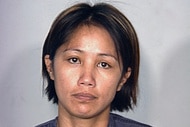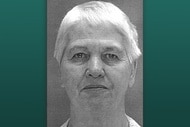Create a free profile to get unlimited access to exclusive videos, breaking news, sweepstakes, and more!
Want To Know More About Jeffrey MacDonald? There's Books, A Miniseries, And More
Jeffrey MacDonald's pregnant wife and two young daughter were savagely killed in the family's Fort Bragg home more than 50 years ago, but the case continues to captivate the public.

Through its five-episode run, FX’s docuseries “A Wilderness of Error” brings new attention to the shocking murders of an Army surgeon’s pregnant wife and two young daughters a half century ago — but it isn’t the only in-depth look at the case.
In the 50 years since military police stumbled upon the grisly scene at the MacDonald family’s Fort Bragg home on Feb. 17, 1970, the crime has inspired multiple books, a 1984 mini-series that transfixed a nation, an episode of "Unsolved Mysteries," and repeated interviews with the man at the center of the case: Jeffrey MacDonald.
MacDonald was convicted of murdering his family in 1979 — nine years after wife Colette MacDonald, and daughters Kimberley and Kristen were killed — but the conviction did not end the speculation surrounding the case and MacDonald has continued to maintain his innocence from behind bars.
Each take on the horrific murders offers a differing view on what transpired the night the family was killed — and who was ultimately responsible for the bloodshed.
True crime fans intrigued by the complex mystery can delve deeper into the case in these books, movies and television shows:
Books
“Fatal Vision”: In 1983, Joe McGinnis’ best-selling book “Fatal Vision” hit bookstore shelves across the country, but this first look into the slayings is also arguably the most controversial.
McGinnis had been hired by MacDonald’s defense team to ostensibly write a book proclaiming his innocence. As part of the arrangement, McGinnis gained unprecedented access to MacDonald and the defense team—even living in the same condo as MacDonald at one point—but the closer McGinnis got the case, the more he became convinced of MacDonald’s guilt. Instead of a complimentary portrayal of the Green Beret surgeon, McGinnis wrote that MacDonald had killed his family in an amphetamine-fueled rage.
“I was devastated,” MacDonald, who has always maintained his innocence, later told Larry King in an interview about the apparent betrayal, according to the docuseries. “It was one of the five or six most destructive days to my psyche ever following the murders and then the false accusation. This was an awful thing.”
The book quickly became a best-seller and rose to the top of the charts.
As for his role in the book, McGinnis said his “only ambition” was to “learn as much of truth as I could and then to tell it as well as I could.”
MacDonald later sued McGinnis in a civil suit alleging that he had broken his agreement to write about MacDonald’s innocence, CNN reported in 2012. A jury could not reach a verdict, but the case was ultimately settled outside of court for $325,000.
The book is currently available to purchase at retailers including Amazon and Barnes & Noble.
“The Journalist and the Murderer”: The relationship between McGinnis and MacDonald takes center stage in Janet Malcolm’s 1990 book “The Journalist and the Murderer,” which examines McGinnis’ tactics and the general relationship between a journalist and his or her subject.
''Every journalist who is not too stupid or too full of himself to notice what is going on knows that what he does is morally indefensible,” Malcolm wrote in the opening of her book according to The New York Times. “He is a kind of confidence man, preying on people's vanity, ignorance, or loneliness, gaining their trust and betraying them without remorse.''
After the bold intro, the book goes on to explore the complex ethical and moral questions that exist between journalists and the subjects whose stories they share.
It is available from various retailers including Amazon, Target, and Walmart.
“Fatal Justice: Reinvestigating the MacDonald Murders”: Pacific Grove novelist Jerry Allen Potter and investigative journalist Fred Bost join forces in this 1995 true crime book that re-examines the controversial case, drawing attention to critical evidence never heard in trial that could have supported MacDonald’s claims that a group of hippies had broken into his family's home the night of the attack, according to a 1995 review in SF Gate.
The novel is the result of a nine-year investigation by the authors, who compiled investigative reports, affidavits, transcripts, witness statements and lab notes as they delved into the complex crime.
“Potter and Bost's dogged detective work, crisply presented and grippingly detailed in ‘Fatal Justice,’ clearly establishes that MacDonald did not receive a fair trial in the court of public opinion or in the legal courts themselves,” reviewer Tara Aronson wrote. “It reveals, too, that in a worst-case scenario, an innocent man has served more than 14 years of a life sentence behind bars.”
The book is currently available at Amazon, Target, Walmart, and eBay.
“A Wilderness of Error: The Trials of Jeffrey MacDonald”: Academy Award-winning filmmaker Errol Morris brings his reputation as a dogged documentary filmmaker to this non-fiction account of the Jeffrey MacDonald case published in 2012. The book — which served as the inspiration for the FX docuseries — is the culmination of 20 years of investigative work, including a 1991 Christmas Day trip to the original crime scene.
Morris calls into question MacDonald’s guilt, challenges the credibility of key evidence in the case and calls out errors made by investigators and the legal system along the way that could have compromised the case.
“I get interested in stuff because I get bothered by stuff and what’s really interesting about the MacDonald murder case is how many, many, people have gone back over this,” Morris later said in the docuseries. “It’s a case that resists definitive explanations. Wandering in that wilderness of conflicting evidence and interpretations of mistakes, of errors.”
The book is sold by multiple retailers including Amazon and Barnes & Noble.
“Final Vision: The Last Word on Jeffrey MacDonald”: Before McGinnis died in 2014 at the age of 71, he revisited the MacDonald case one final time in a 2012 Kindle Single e-book called “Final Vision: The Last Word On Jeffrey MacDonald” that looked at the numerous appeals in the case since his initial true crime book was published in 1983.
Despite the decades that had passed since the conviction, McGinnis remained convinced that the correct man was behind bars.
“So many decent people have wasted so much time, energy and money believing in MacD,” McGinnis once told the Press Telegram. “He suckered me for far too long, and he has suckered others for much longer.”
McGinnis’ final thoughts on the controversial case can be purchased on Amazon.
Miniseries
“Fatal Vision”: The popularity of McGinnis’ book quickly spawned an NBC mini-series of the same name. The 1984 dramatization — which stars Gary Cole as MacDonald and Karl Malden as Colette MacDonald’s relentless stepfather Freddy Kassab — attracted “millions of viewers,” including 60 million on just one night of the series, according to FX’s “A Wilderness of Error.”
Malden won an Emmy in 1985 for outstanding supporting actor in a limited series or a special for his portrayal of Kassab, according to Emmys.com.
“Everything was dead on. Everything was right,” Colette’s brother Bob Stevenson said of the movie’s accuracy in the docuseries.
But much like McGinnis’ book, MacDonald and his defense team took issue with the production.
Fellow author Errol Morris has also criticized McGinnis’ account saying it unfairly biased the public and took something very complex and made it simple.
“’Fatal Vision’ was perhaps even more damning than the trial itself,” Morris said in the docuseries. “People saw Jeffrey MacDonald killing his family.”
The miniseries is difficult to track down today; however, Amazon offers a few ways to purchase the movie—but you may have to dust off your VCR and be willing to spend a bit of cash to see the dramatic account of the crime.
Television
“The Dick Cavett Show”: Less than a year after his family was brutally killed in their Fort Bragg home, Jeffrey MacDonald appeared on “The Dick Cavett Show” on Dec. 15, 1970. MacDonald’s cavalier attitude on the late night talk show — which even earned laughs from the audience — aroused suspicion from Colette MacDonald’s family and they would soon embark on their own quest for justice.
“60 Minutes”: MacDonald also sat down with Mike Wallace of “60 Minutes” to discuss the case in the 1980s. During the interview, Wallace revealed McGinnis’ betrayal to a shocked MacDonald. The interview is available for CBS All Access subscribers.
“Final Appeal: From The Files of Unsolved Mysteries”: The Jeffrey MacDonald case got the "Unsolved Mysteries" treatment in 1992 as part of “Final Appeal: From The Files of Unsolved Mysteries,” according to TV.com. Few records remain, however, about the episode. It’s unclear where it can be seen today.
“Larry King Live”: A much older-looking MacDonald sat down with legendary interviewer Larry King in 2003 to discuss details of case, including his recollection of what happened that night. MacDonald continued to maintain that he had been asleep on the couch in the family’s Fort Bragg home when he heard a group of hippies and his wife screaming for help.
“I heard my wife, I heard my daughter, and I saw these people, and I either said -- and I to this day don't know if I said it or thought I was going to say it -- you know, 'What the hell are you doing here? Who are you? What's going on?' And the black male to the left raised something, and he swung a club at me. And I threw my hand up, and he hit me in the head with the club, which I took to be a baseball bat. He drove me back to the couch that I was sleeping on,” MacDonald recalled.
A full transcript of the interview can be found on CNN.com.


























